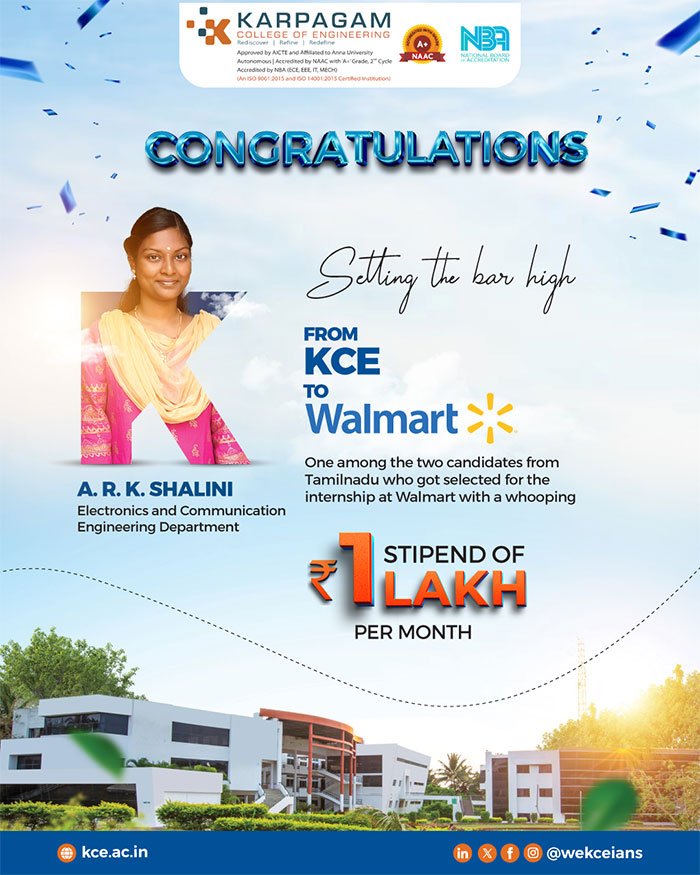About the Department

The department has competent and committed faculty who facilitate students’ involvement in various co-curricular activities along with their academics. The department also takes initiatives for the conduct of various inter/intra collegiate competitions to improve the inter-personal skills of students. The students are also provided with the finest opportunities to join various professional societies like ACM, IEEE, CSI, etc. The CSI student branch of KCE has won the Best Student Branch award successively for the last three years.
The CST Department is active in college NPTEL Local Chapter through which students can join online courses and get certified which is offered by IIT faculty.
CST department has well equipped computer laboratories and a High Performance Computing Centre for research and project activities. The department has the latest infrastructure facilities with high speed Internet, advanced software and hardware labs, seminar halls and ICT enabled class rooms equipped with LCD projectors.
Vision
To create computer professionals with a strong academic and technical background to achieve special distinction at the national and international arena and also to serve and lead the society.
Mission
- Providing excellent learning opportunities and environment for students in Computer Science and Technology to meet the technological needs of the Nation as a whole
- Establishing centers of research in computer technology application areas for the immediate and pressing needs of the society
- Developing ICT based solutions for the development of the nation
- Mentoring with care that leads to the students evolving as entrepreneurs who will make innovative technological products to benefit the nation and compete in the world market.
Regulations
Courses Offered
- B.E. Computer Science and Technology
Programme Educational Objectives
- PEO1: Graduates will be able to comprehend mathematics, science, engineering fundamentals, laboratory and work-based experiences to formulate and solve problems in Computer Science and Technology and other related domains and will develop proficiency in computer based technologies and the use of computation techniques.
- PEO2: Graduates will be prepared to communicate and work effectively on the multidisciplinary engineering and technology projects practicing the ethics of their profession with a sense of social responsibility.
- PEO3: Graduates will recognize the importance of lifelong learning to become experts either as entrepreneurs or employees and to widen their knowledge in their domain
PO1: Engineering knowledge
Apply the knowledge of mathematics, science, engineering fundamentals, and an engineering specialization to the solution of complex engineering problems.
PO2: Problem analysis
Identify, formulate, review research literature, and analyze complex engineering problems reaching substantiated conclusions using first principles of mathematics, natural sciences, and engineering sciences.
PO3: Design/development of solutions
Design solutions for complex engineering problems and design system components or processes that meet the specified needs with appropriate consideration for the public health and safety, and the cultural, societal, and environmental considerations.
PO4: Conduct investigations of complex problems
Use research-based knowledge and research methods including design of experiments, analysis and interpretation of data, and synthesis of the information to provide valid conclusions.
PO5: Modern tool usage
Create, select, and apply appropriate techniques, resources, and modern engineering and IT tools including prediction and modeling to complex engineering activities with an understanding of the limitations.
PO6: The engineer and society
Apply reasoning informed by the contextual knowledge to assess societal, health, safety, legal and cultural issues and the consequent responsibilities relevant to the professional engineering practice.
PO7: Environment and sustainability
Understand the impact of the professional engineering solutions in societal and environmental contexts, and demonstrate the knowledge of, and need for sustainable development.
PO8: Ethics
Apply ethical principles and commit to professional ethics and responsibilities and norms of the engineering practice.
PO9: Individual and team work
Function effectively as an individual, and as a member or leader in diverse teams, and in multidisciplinary settings.
PO10: Communication
Communicate effectively on complex engineering activities with the engineering community and with society at large, such as, being able to comprehend and write effective reports and design documentation, make effective presentations, and give and receive clear instructions.
PO11: Project management and finance
Demonstrate knowledge and understanding of the engineering and management principles and apply these to one’s own work, as a member and leader in a team, to manage projects and in multidisciplinary environments.
PO12: Life-long learning
Recognize the need for, and have the preparation and ability to engage in independent and life-long learning in the broadest context of technological change.
- PSO1: Analyze, design, implement, test and evaluate computer programs in the areas related to networking, Storage Systems, web design, cloud computing, IoT and data capturing analysis of varying complexity.
- PSO2: Develop innovative ideas to provide solutions for complex technological problems and apply advanced knowledge of computer technology domain to identify research challenges in Computer Science and Technology.
| S.No | Name | Designation | Qualification |
|---|---|---|---|
| 1 | Dr. Shakthi Priya | Professor | M.E, Ph.D |
| 2 | Dr.Kokila V | Associate Professor | M.E, Ph.D |
| 3 | Mr. Vijayakumar N | Assistant Professor | M.E |
| 4 | Mr. Navaneetha Krishnan M | Assistant Professor | M.E |
| 5 | Ms. Sandhiya V CS | Assistant Professor | M.E |

